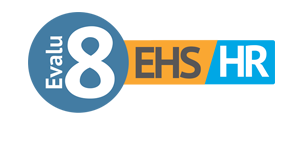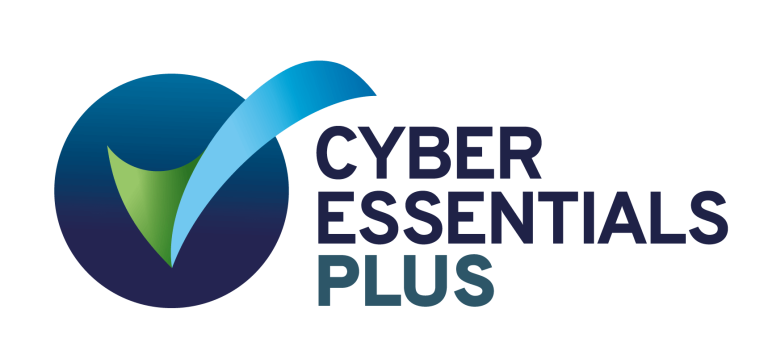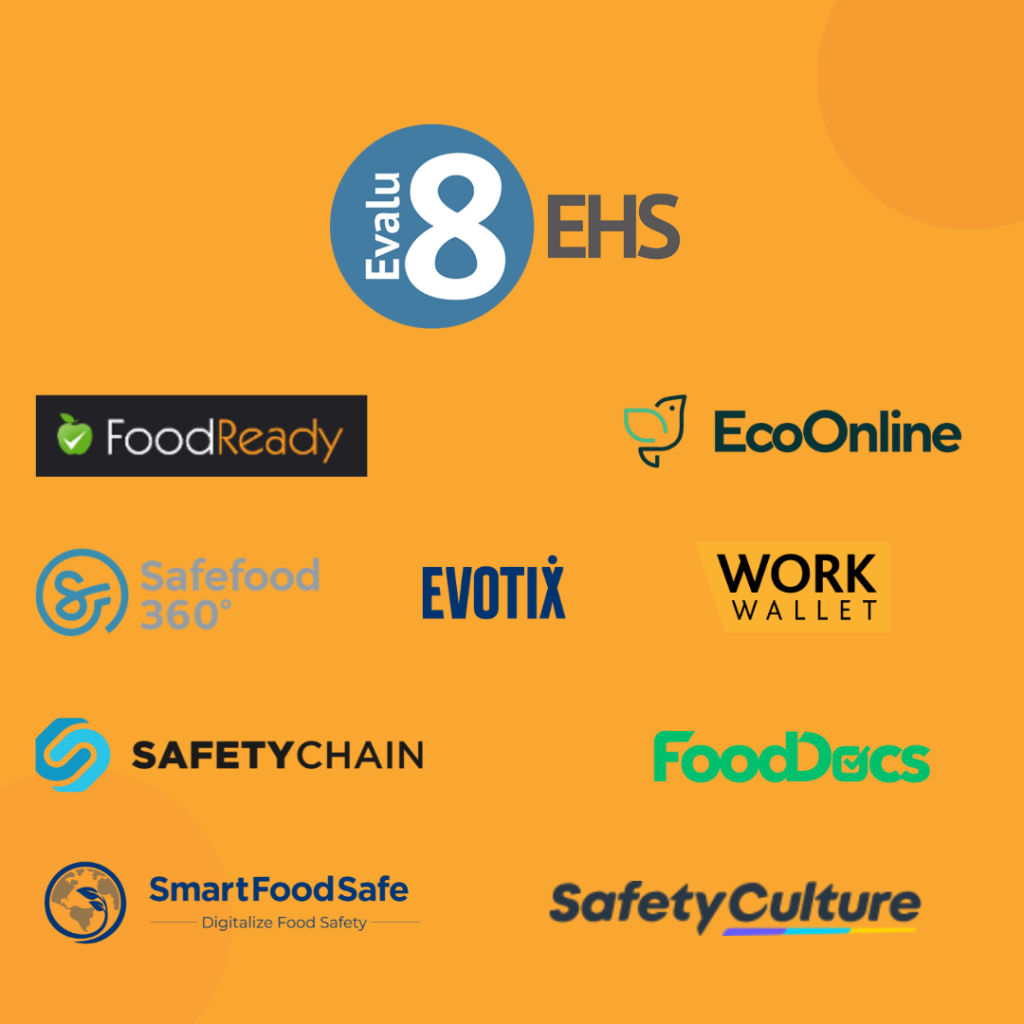
Choosing the right EHS software is essential for UK food and beverage processors aiming to stay compliant, manage risk, and safeguard product safety. With strict Food Standards Agency requirements, HACCP controls, allergen tracking, and BRC/IFS certification, an effective EHS management system can make all the difference.
But with so many solutions on the market, which platform best suits your operation?
In this guide, we compare the top 10 EHS software solutions for UK food and beverage processors in 2025, evaluating their features, compliance strengths, pricing models, and industry suitability. Whether you need detailed HACCP workflows, mobile‐friendly audit tools, or real‐time allergen management, this list will help you choose with confidence.
Helpful summary
Overview: This article, brought to you by Evalu-8 EHS, provides an in‐depth comparison of the top 10 EHS software platforms tailored to UK food and beverage processing in 2025. It examines core features, industry‐specific compliance capabilities, pricing approaches, and suitability for various sub‐sectors from meat packing and dairy to ready‐meal production and beverage bottling.
Why trust us: At Evalu-8 EHS, we specialise in modular, UK‐focused safety software that addresses real‐world challenges in food processing. Our team understands HACCP planning, allergen controls, temperature monitoring, traceability, and audit management precisely what food and drink manufacturers require from their EHS systems.
Why it matters: Regulatory scrutiny from the FSA, retailer audits, and consumer expectations around hygiene and safety are at an all‐time high. The right EHS software can transform reactive compliance into proactive risk management, reduce recalls, and improve overall product quality.
Action points: Use this guide to assess which EHS platform aligns with your facility size, product type, and compliance goals. Whether you need a specialised HACCP solution or a comprehensive all-in-one system, this article will help you move forward confidently.
Evalu-8 EHS: Best safety software for food and beverage processing
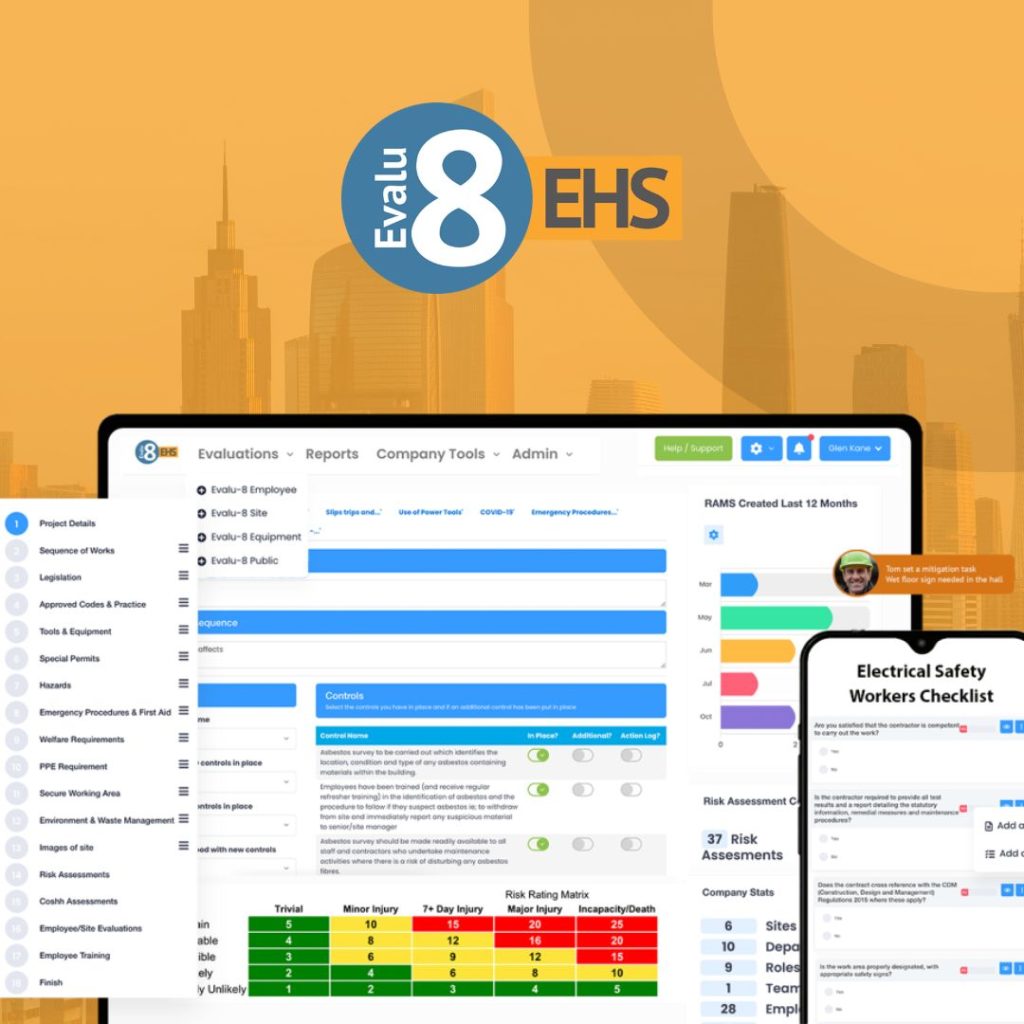
Why Evalu-8 EHS stands out
Evalu-8 EHS is a safety platform built for UK organisations, including food and beverage processors. Designed with small to mid-sized manufacturers in mind, it is scalable and highly customisable letting you select only the modules you need. Whether tracking HACCP plans, recording audit findings, or managing temperature logs, Evalu-8 provides a centralised system that streamlines compliance, reduces paperwork, and supports food safety culture.
Customers include
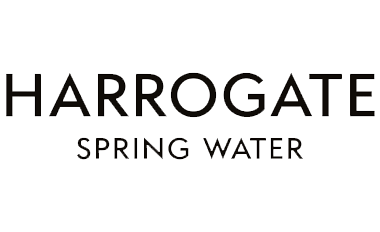
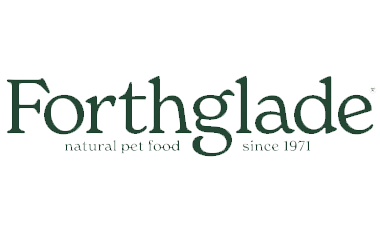
Core Features
HACCP workflows: Create, assign, and review hazard analyses with built-in templates and temperature checkpoint reminders
RAMS and SOPs: Generate detailed method statements and standard operating procedures for line changeovers or cleaning in place
Allergen management: Store and update allergen registers, attach to recipes, and automate operator sign-offs before production
Equipment & asset tracking: Schedule and log cleaning, calibration, and maintenance for mixers, chillers, and packaging lines
Incident & non-conformance reporting: Capture quality incidents, near misses, and microbiological test failures via desktop or mobile
Safety audits & inspections: Build bespoke checklists for hygiene audits, CCTV compliance, and pest control checks with photographic evidence
Training matrix: Maintain staff competencies, monitor expiry dates, assign e-learning modules, and store certificates centrally
eSignatures: Operators can digitally acknowledge HACCP checks, COSHH sign-offs, and corrective actions in real time
Mobile app: Floor staff can access SOPs, complete audits, log incidents, and capture temperature data on the move
Advanced features
Multi-site management: Consolidate data from multiple processing sites or co-packers in a single dashboard
Real-time dashboards: Customisable views show live data on CCP deviations, corrective action status, and training gaps
Automated alerts & reminders: Notify teams of overdue cleaning cycles, expiring certificates, or failed temperature checks
Document control: Store policies, ingredient specifications, and supplier certificates with version history and permissions
Traceability integration: Link batch records, lot numbers, and supplier details to ensure rapid recall response
Explore Evalu-8 EHS
Pricing
Evalu-8 EHS operates on a modular, pay-as-you-grow model. Core platform pricing starts at £2.50 per user per month. There are add ons available such as RAMS, COSHH and more. Prospective buyers can request a demo and custom quote.
Pros & cons
Pros:
- Scalable for small to mid-sized UK food processors
- Comprehensive HACCP, allergen, and audit workflows
- Mobile app supports on-line temperature capture and audits
- Digital sign-offs reduce paperwork and human error
- Real-time dashboards improve decision-making
Cons:
- Microbiological results integration requires additional setup
- Advanced reporting templates may need consultancy support
Food Docs

Food Docs is a dedicated digital HACCP and food safety platform designed explicitly for food and drink manufacturers. Its user-friendly interface and pre-built templates allow rapid deployment so businesses can digitise their food safety plans in days, not months. With automated monitoring of CCPs, allergen controls, and cleaning schedules, Food Docs helps reduce manual errors and ensures audit readiness.
Core features
Risk assessment builder: Create, edit, and issue RAMS from any device using pre-written templates or custom content
Method statement templates: Access editable templates tailored to rail tasks such as possession work, overhead line projects, and depot maintenance
COSHH assessments: Choose from thousands of assessments or create your own for track greases, paints, diesel, and cleaning fluids
Toolbox talks & training records: Deliver and track toolbox talks on fatigue awareness, electrical hazards, and isolation procedures
Digital signatures: Secure documents with e-signatures to ensure accountability and compliance
Multi-user access: Assign roles, control access levels, and collaborate across teams in real time
Pre-made templates: Access a library of forms including site audits, PPE checklists, and isolation forms
Advanced features
Custom trade group libraries: Tailor content by rail trade or activity type to speed up RAMS generation
Document duplication & archiving: Reuse existing method statements for similar tasks and archive outdated packs for audit history
Cloud storage: Access and store all documents securely in the cloud, from any device, including offline access
Constraints and functionality gaps
Limited incident reporting: RAMS App is focused on RAMS and method statements. It does not offer full incident management or fatigue tracking modules
Integration gaps: The platform operates as a standalone solution. Integration options with broader EHS systems or crew rostering tools are not widely supported
Specialist rail requirements: While templates cover common rail tasks, highly bespoke procedures (such as complex isolation protocols) may need manual template adjustment
Pricing
RAMS App offers flexible pricing based on business size and user needs. For single users, pricing starts at £399 per year (excluding VAT). Multi-user plans are tailored to the number of users and modules required. A free trial is available for rail organisations to evaluate the platform.
Pros & cons
Pros:
- Rapid creation of RAMS and method statements on site
- Extensive library of rail-specific content and templates
- Mobile-friendly with offline access for remote track locations
- Digital signatures ensure compliance and accountability
Cons:
- No built-in incident or fatigue management tools
- Limited integration with other EHS or rostering systems
- Complex isolation procedures may require manual template edits
Safefood 360

Safefood 360 is a cloud-based, all-in-one food safety and quality management platform used by major UK and global food brands. It consolidates HACCP, quality control, supplier management, and audit tracking within a single system. With seamless integration of real-time monitoring, supplier risk assessment, and document management, safefood 360 addresses end-to-end food safety and compliance.
Core features
HACCP & PRP management: Build, review, and update HACCP plans, prerequisite programs, and vulnerability assessments
Quality control: Configure QC checklists for raw materials, in-process samples, and finished goods, including microbiological testing
Supplier approval: Create risk profiles, manage audits, and track corrective actions for ingredient and packaging suppliers
Non-conformance & CAPA: Log defects, initiate investigations, and assign corrective and preventive actions to root causes
Document management: Store procedures, test methods, and audit reports with version control and access permissions
Audit management: Plan, schedule, and track internal and third-party audits with discrepancy logs and trend analysis
Mobile audit app: Conduct on-site inspections, complete checklists, and capture photos via iOS or Android devices
Advanced features
Real-time analytics: Custom dashboards show KPIs such as CCP deviations, supplier performance, and quality trends
Lab integration: Import lab results automatically from LIMS systems or send requests directly from safefood 360
Risk assessment tools: Perform vulnerability assessments and risk scoring for new products, processes, or suppliers
Compliance tracking: Map FSA, BRC, IFS, and customer-specific standards to internal checklists and show real-time compliance gaps
Constraints and functionality gaps
Implementation time: Robust configuration and setup may take 8–12 weeks, especially for multi-site rollouts
Cost: Enterprise-level features and integrations can be expensive; small processors may find entry pricing high
Pricing
Safefood 360 pricing is based on facility size, module selection, and number of users. Starter packages for smaller operations begin around £1,000 per month enterprise pricing available on request.
Pros & cons
Pros:
- Comprehensive quality, safety, and supplier management in one system
- Lab and LIMS integration streamlines testing workflows
- Real-time dashboards aid data-driven decisions
- Mobile audit app improves field data capture
Cons:
- Longer implementation cycle for full feature rollout
- Higher cost may be prohibitive for very small processors
SafetyCulture
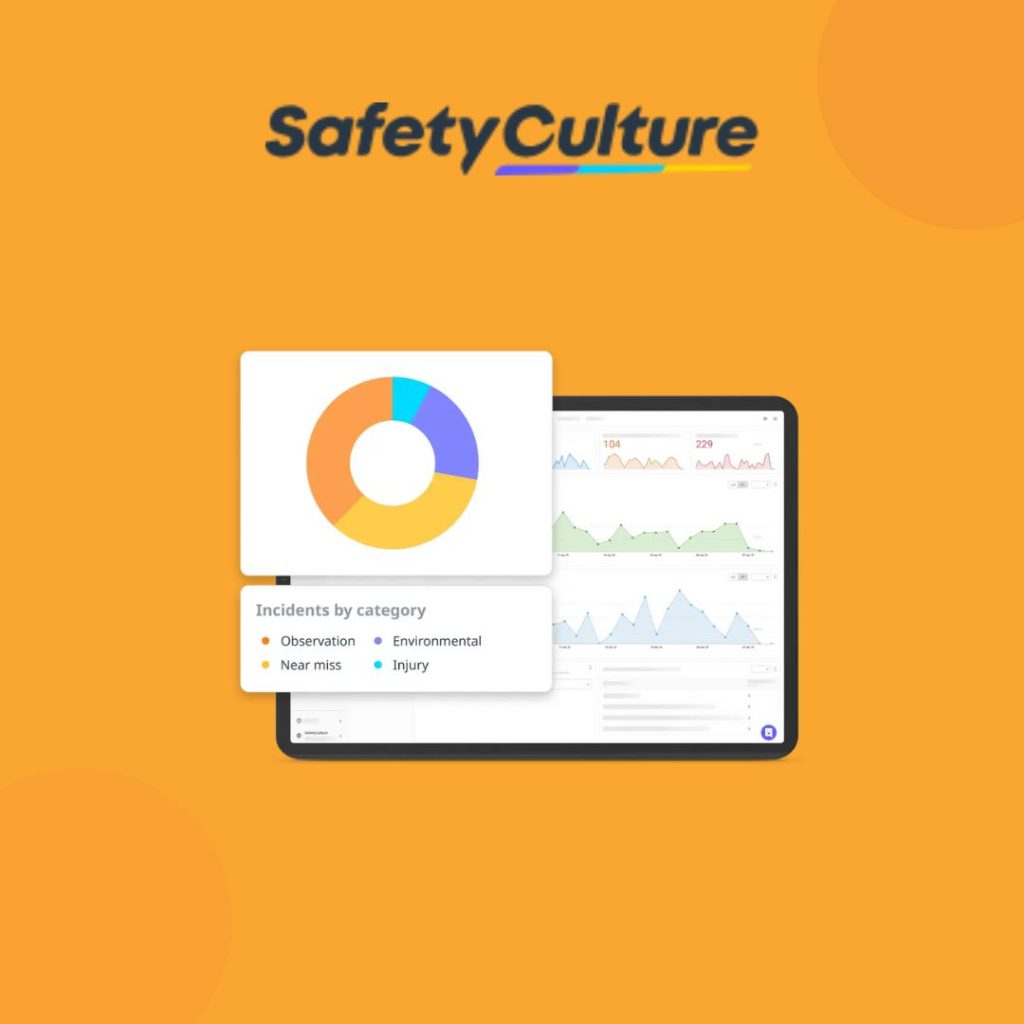
SafetyCulture, formerly known as iAuditor, is a versatile, mobile-first inspection and checklist platform. Though not exclusively for food, its flexible template builder and powerful analytics make it invaluable for hygiene audits, equipment checks, and safety walkthroughs in processing environments. Its rapid uptake and low learning curve mean teams can deploy custom checklists and capture real-time data on the plant floor.
Core features
Customisable checklists: Build templates for hygiene audits, machine guarding inspections, or slip and trip risk assessments
Mobile data capture: Operators complete forms, attach photos, and add annotations using smartphones or tablets
Issue reporting: Automatically generate corrective action tasks when non-conformances are found, assign to responsible staff
Analytics dashboard: Aggregate audit results, identify recurring issues, and track resolution dates
Offline functionality: Complete inspections in low-connectivity areas (e.g. cold stores or remote production halls) and sync when online
Template marketplace: Access industry-standard checklists, including BRC food safety modules and HACCP verification templates
Advanced features
- Integration APIs: Push inspection results into other systems (e.g. ERP or QMS) for consolidated reporting
Automated reports: Generate PDF or CSV reports for management review and regulatory submission
Constraints and functionality gaps
No built-in HACCP workflows: SafetyCulture provides generic templates but lacks a structured HACCP plan builder
Limited allergen controls: Custom fields can track allergens, but no dedicated allergen register module
Pricing
SafetyCulture offers tiered subscriptions: Basic (free for single users), Premium (£20 per user per month), and Enterprise packages with advanced analytics and integrations priced on request.
Pros & cons
Pros:
- Very fast deployment checklists live in hours
- Highly customisable to any audit or inspection need
- Offline mode suits cold stores and remote areas
- Analytics visualise trends and hotspot areas
Cons:
- No predefined HACCP or allergen modules; requires customisation
- Lacks full QMS or supplier management functionalities
SafetyChain

SafetyChain provides a specialized EHS and quality management suite for food and beverage. Its strength is in real-time data collection, intelligent workflows, and advanced supplier risk profiling. Designed for large, multi-site processors, SafetyChain integrates on the plant floor, supplier farms, and distribution centers ensuring end-to-end visibility of safety and quality metrics.
Core features
Real-time SPC and CCP monitoring: Connect to sensors on mixers, cookers, and chillers to capture live temperature, pH, or viscosity data
Supplier risk assessment: Score and monitor supplier performance based on audit results, certifications, and non-conformance history
GFSI standards tracking: Out-of-the-box modules for BRC, SQF, and IFS with gap analysis and compliance heatmaps
Mobile data capture: Floor staff log data, complete checklists, and capture photos via handheld devices for instant upload
Non-conformance management: Auto-generate corrective actions, notify stakeholders, and track resolution workflow
Document and training management: Centralised control of SOPs, sanitisation plans, and employee training records
Advanced features
Integration with ERP and MES: Push live data into ERP or Manufacturing Execution Systems for a single source of truth
Predictive analytics: Identify trends in CCP deviations, supplier failures, or equipment downtime to prevent recalls
Geo-fencing and temperature mapping: Monitor cold chain integrity for in-transit shipments and on-site cold rooms
Workflow automation: Trigger email or SMS alerts when critical limits are exceeded or audits are missed
Constraints and functionality gaps
Implementation complexity: Large-scale multi-site rollouts can take several months and require dedicated project resources
Cost: Pricing is oriented toward enterprise budgets; smaller processors may find entry fees steep
Pricing
SafetyChain employs subscription-based pricing according to module selection, site count, and integration scope. Mid-range packages begin around £2,000 per month, with enterprise pricing by custom quote.
Pros & cons
Pros:
- Powerful real-time data integration for CCP and SPC monitoring
- End-to-end supplier risk management and audit tracking
- Advanced analytics help prevent non-conformances and recalls
- GFSI‐aligned modules speed up certification
Cons:
- Longer implementation timeline for full feature adoption
- Higher cost point geared toward large organisations
Smart Food Safe

Smart Food Safe is a purpose-built food safety platform for smaller operations, focusing on simple HACCP, allergen tracking, and basic audit functionality. Its no-frills interface and pre-loaded templates for common food hazards make it easy to adopt. With straightforward pricing and minimal configuration, Smart Food Safe appeals to processors that need a light-touch EHS solution without complex modules.
Core features
Basic HACCP builder: Guided setup wizard walks new users through hazard analysis and CCP identification
Allergen control: Pre-defined allergen icons, auto-generated labels, and operator sign-off tracking before production runs
Cleaning & sanitation logs: Digital checklists for daily line sanitisation, CIP procedures, and equipment washdowns
Temperature records: Manual or sensor-linked entries for fridge, freezer, and pasteuriser checks
Simple audit checklists: Covers core BRC “Global Standard for Food Safety” modules and FSA requirements
Document storage: Central location for uploading SOPs, ingredient specifications, and audit evidence
Advanced features
Email reminders: Automated notifications for overdue cleaning tasks, CCP checks, or staff training refreshers
Exportable logs: Download HACCP records, audit findings, and temperature data as CSV for local analysis
Mobile compatibility: Responsive web app allows floor staff to complete forms on tablets or smartphones
Constraints & functionality gaps
Limited depth: No supplier management or advanced analytics dashboards
Manual lab results: Microbiological results must be entered manually; no LIMS integration
Pricing
Smart Food Safe offers fixed annual pricing starting at £500 per site, which includes unlimited users and all core features. Optional add-ons (e.g., temperature probes integration) are available for additional fees.
Pros & Cons
Pros:
- Quick setup HACCP and allergen controls live in days
- Affordable flat-fee pricing for smaller processors
- Intuitive interface needs minimal training
- Responsive design works on any device
Cons:
- No supplier or complex audit modules
- Analytics limited to basic exports; no real-time dashboards
Eco Online

Eco Online provides a full‐spectrum EHS platform that excels at chemical safety, environmental permitting, and sustainability tracking. For food and beverage processors handling cleaning agents, CIP chemicals, and wastewater discharge, Eco Online ensures robust COSHH compliance, incident management, and environmental reporting complementing any HACCP or quality management system in place.
Core features
COSHH management: Access digital Safety Data Sheets (SDS), assign hazard codes, and automate review reminders for cleaning agents and sanitizers
Incident & spill reporting: Log chemical spills, near misses, and food safety incidents with workflows for investigation and corrective actions
Audit & inspection management: Schedule environmental audits, equipment inspections, and housekeeping checks; capture photos and evidence
Permit to work: Issue digital permits for high‐risk tasks like boiler maintenance, waste disposal, and chemical tank cleaning
Wastewater & environmental monitoring: Track effluent parameters and generate compliance reports for regulators
Training & competency: Assign and track chemical handling courses, COSHH refresher training, and environmental awareness programs
Advanced features
Real‐time dashboards: Monitor key environmental KPIs such as chemical usage, waste volumes, and permit expirations across multiple sites
Contractor management: Maintain records and compliance documents for external cleaning crews and maintenance contractors
Sustainability metrics: Capture water usage, energy consumption, and carbon footprint data to support corporate sustainability goals
Mobile access: Floor teams complete COSHH assessments, register spills, and upload corrective action photos from tablets
Constraints and functionality gaps
No built‐in HACCP module: Primarily focused on chemical and environmental compliance; requires integration with a dedicated HACCP solution
Pricing by quote: No transparent pricing tiers on the website; potential buyers must request bespoke proposals
Pricing
Eco Online uses a modular pricing approach based on facility size, required modules (e.g., COSHH, environmental), and number of users. A basic COSHH package starts around £1,000 per month, with additional modules quoted separately.
Pros & cons
Pros:
- Industry‐leading chemical safety and COSHH controls
- Comprehensive environmental monitoring and reporting tools
- Sustainability tracking supports corporate goals
- Mobile app enables quick spill reporting and audit completion
Cons:
- No native HACCP or allergen tracking modules
- Higher cost for full module set; small processors may find entry point expensive
Food Ready

Food Ready is a niche EHS solution built specifically for ready-meal and prepared food manufacturers. It combines recipe management, allergen tracing, and production planning with core quality and safety modules. Its focus on batch traceability and ingredient sourcing makes it particularly well-suited to processors under strict retailer or NHS contract audits.
Core features
Recipe & formulation management: Store master recipes, ingredient specifications, and nutrition data; track version changes automatically
Allergen tracing: Map allergens through multi-ingredient recipes and production lines; auto-generate allergen statements for labels
Batch traceability: Link finished goods to ingredient lots, supplier certificates, and production dates for rapid recall response
Quality control checklists: Configure QC plans for incoming raw materials, in-process sampling, and finished product checks, including microbiological testing
Label generation: Produce compliant food labels with up-to-date ingredient and allergen information
Audit readiness: Preloaded checklists for BRC Food Safety and industry-specific retailer standards
Advanced features
Supplier integration: Pull ingredient QC data and COAs directly from approved supplier portals
Production scheduling: Integrate with MES to align batch records, line speeds, and cleaning schedules
Mobile scanning: Scan barcodes or QR codes on pallets to confirm ingredient acceptance, upload QC results, and close tasks
Dashboard analytics: Visualise batch yields, allergen incidence, and audit non-conformances in one place
Constraints and functionality gaps
Limited general EHS functionality: Emphasis is on recipe, traceability, and QC; lacks deeper incident management for non-food safety events
No standalone temperature monitoring: Relies on third-party integrations to capture in-process temperature data
Pricing
Food Ready pricing is tailored to SKUs, user count, and integration needs. Entry-level packages start from £1,500 per month, with advanced modules quoted based on facility size and customisation.
Pros & cons
Pros:
- Dedicated recipe and allergen tracing for prepared food manufacturers
- Built-in label generation ensures compliance with FSA guidelines
- Batch traceability enables fast, accurate recall management
- Supplier integrations consolidate QC data
Cons:
- Lacks full EHS incident management and environmental modules
- Temperature monitoring requires integration with external systems
Work Wallet

Work Wallet is a mobile-first EHS platform that excels at frontline compliance, training, and inductions. For food processors with large shift workforces or temporary staff, Work Wallet ensures staff complete mandatory training, SOP sign-offs, and safety briefings before starting work. It bridges the gap between office‐based EHS teams and floor operators.
Core features
Digital inductions & toolbox talks: Present SOPs, HACCP overview, and allergen awareness modules to new hires via tablet or smartphone
Incident & near-miss reporting: Floor staff capture food safety incidents, equipment faults, or slip hazards in real time with photo uploads
Task management: Assign recurring cleaning tasks, maintenance checks, and audit follow-ups with automated reminders
Audits & inspections: Conduct daily hygiene, line checks, and CIP verifications using custom templates; log results and track closures
Training records: Maintain an up-to-date digital training matrix, record expiry dates, and assign refresher courses automatically
Permit to work: Issue and track digital permits for high-risk tasks such as line changeovers or chemical tank cleanouts
Advanced features
Safety cards: Issue digital safety credentials to staff, consolidating their training, competencies, and site permissions in one place
Contractor gateway: Provide subcontractors with a portal to upload their food safety and hygiene qualifications before site access
Offline access: Staff can complete tasks and log incidents even in walk-in freezers or remote storage, with data syncing when back online
Custom dashboards: Real-time visibility of overdue audits, open incidents, and training gaps across all shifts
Constraints and functionality gaps
Limited HACCP planning: Focuses on task and training management; lacks a structured HACCP module
No built-in allergen register: Operators track allergens via custom forms; no dedicated allergen module
Pricing
Work Wallet pricing starts at £1 per user per month, with additional fees for advanced modules like safety cards or contractor gateway. A free trial is offered to test core functionality.
Pros & cons
Pros:
- Rapid deployment for frontline compliance and training
- Mobile-first design ensures data capture in challenging environments
- Offline mode critical for cold stores and remote areas
- Automated reminders keep tasks and training on schedule
Cons:
- No native HACCP or allergen tracking features
- Requires integration with a dedicated food safety platform for full coverage
Evotix
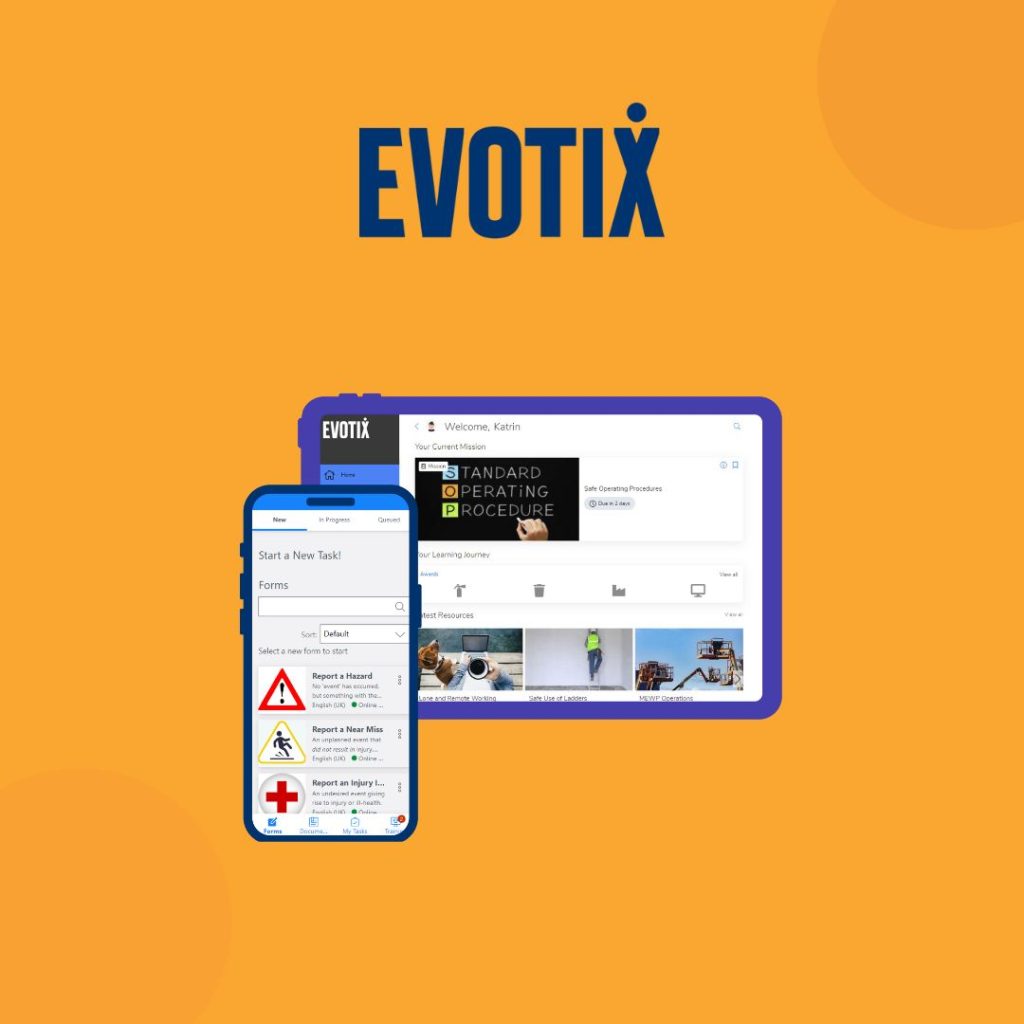
Evotix is a modern, mobile-friendly EHS platform that emphasises safety culture, ESG reporting, and operational risk management. For food and beverage processors building a proactive safety mindset and reporting on sustainability metrics, Evotix provides the tools to engage employees, track KPIs, and integrate environmental data helping to meet both food safety and corporate responsibility goals.
Core features
Incident & near-miss reporting: Streamline reporting of food safety issues, equipment failures, and hygiene lapses, with workflows for immediate corrective actions
Risk assessments: Build, assign, and review risk assessments for manual handling, slip hazards, and chemical usage in cleaning operations
Audit & inspection management: Configure checklists for hygiene, pest control, and equipment maintenance; assign tasks and track completion
Training & micro-learning: Create short, in-app micro-learning modules on HACCP principles, allergen protocols, and hand hygiene
Document management: Securely store SOPs, ingredient specifications, and supplier certificates with version control and access permissions
ESG reporting: Capture water usage, energy consumption, and waste generation to support sustainability initiatives and produce CSR reports
Advanced features
Custom dashboards: Real-time views of food safety KPIs, inspection gaps, and ESG metrics, with drill-down capability by site or process line
Integration capabilities: Connect with temperature sensors, manufacturing execution systems, and corporate reporting tools for consolidated data
Behavior-based safety: Track safety observations, near misses, and positive interventions to reinforce safe practices on the plant floor
Mobile accessibility: Empower floor staff to complete audits, report incidents, and access SOPs from any device, even in offline mode
Constraints and functionality gaps
No built-in recipe management: Focus is on safety culture and ESG; recipe tracking requires external integration
Full HACCP module requires customisation: Base platform needs configuration to align with detailed HACCP workflows
Pricing
Evotix follows a bespoke pricing model based on user count, module selection, and integration scope. Entry pricing begins around £1,500 per month for core EHS and ESG features; full enterprise packages quoted on demand.
Pros & cons
Pros:
- Strong emphasis on safety culture and ESG reporting
- Modern, mobile-first interface drives engagement
- Behavior-based safety tools reinforce proactive food safety behaviors
- Custom dashboards aggregate EHS and sustainability data
Cons:
- No native recipe or allergen tracking modules
- Requires configuration to support full HACCP workflows
Overview: The Top 10 EHS Software Platforms for UK Food & Beverage Processing in 2025
Comprehensive EHS Platforms (Best for Mid-to-Large Processors)
These systems offer wide-ranging compliance, audit, and governance features but often come with higher complexity and cost, making them better suited to large enterprises.
Evalu-8 EHS: Combines HACCP planning, allergen tracking, cleaning schedules, audits, and supplier traceability in one UK-focused system. Modular design makes it powerful yet scalable, unlike global enterprise tools.
EcoOnline: Enterprise-grade safety and compliance software with strong chemical management, but can feel complex and less food-industry specific.
Evotix: Compliance-heavy EHS platform with advanced reporting, but implementation and cost often stretch beyond SME needs.
Integrated & Flexible Solutions (For SMEs & Mid-Sized Food Businesses)
These tools strike a balance between usability and features, offering more than just HACCP checklists without becoming overly complex.
Evalu-8 EHS: UK-built and modular. Offers rota-linked cleaning schedules, live audit dashboards, temperature monitoring, allergen compliance, and automated reporting designed specifically for food and drink manufacturers.
Work Wallet: Good for SMEs with mobile-first inspections and incident reporting, but limited depth in HACCP and supply chain traceability.
SafetyCulture (iAuditor): Strong for mobile inspections and checklists, but lacks food-specific compliance depth (e.g., allergen controls, traceability).
Specialist HACCP & Food Safety Platforms
These platforms are purpose-built for HACCP, audits, and food safety, often ideal for smaller processors or specialist facilities, but they may lack broader EHS integration.
Evalu-8 EHS: Goes beyond HACCP by linking food safety checks with wider EHS management, compliance tracking, and corrective action logging. Suitable for SMEs and scaling manufacturers.
FoodDocs: HACCP-focused with strong automation for small food businesses, but less customisable for larger operations.
FoodReady: Designed for digital HACCP plans and FDA compliance, useful for exports but less tailored to UK FSA requirements.
SmartFoodSafe: Specialises in digitalising HACCP, allergen, and food safety records, but doesn’t cover wider EHS needs.
Simpler & Audit-Focused Platforms
These systems are straightforward and affordable, good for digitising inspections, but usually lack the full compliance stack needed for scaling food manufacturers.
Evalu-8 EHS: Provides easy-to-use mobile inspections, photo evidence capture, and audit trails, but also scales to cover wider risk management, unlike single-purpose tools.
Safefood 360°: Strong on compliance workflows, but best suited for QA-heavy teams; can feel over-engineered for SMEs.
SafetyChain: Good for audit tracking and supplier compliance, but more US-focused than UK
How to Choose the Best EHS Platform for Food Processing
Check food-specific compliance: Look for HACCP, allergen control, FSA compliance, and traceability.
Balance usability with depth: Lightweight apps may be simple, but scaling requires more advanced features.
Think UK-first: Ensure the platform aligns with FSA, retailer audit standards, and GDPR.
Prioritise proactive tools: Choose systems that reduce recall risk by linking audits, inspections, and corrective actions.
Evalu-8 EHS is the standout platform across all categories. Unlike competitors, it is UK-built, food-industry focused, and modular, making it simple enough for SMEs yet scalable for large processors. It’s the only solution that replaces HACCP-only tools, audit apps, and enterprise EHS systems with one unified platform.
Choosing the best EHS software for your food and beverage operation
The right EHS system helps processors maintain compliance, reduce risk, and improve product safety. While many platforms cater specifically to HACCP, allergen control, or chemical management, Evalu-8 EHS provides a comprehensive, modular solution built for UK requirements. With modules such as RAMS, COSHH, Accidents and Incident reporting and more. Evalu-8 EHS is the most versatile and cost-effective choice for food and beverage processors in 2025.
Book a demo today to see how it can streamline your EHS and quality workflows.
FAQs
Look for HACCP and allergen management, batch-level traceability, incident reporting with photo evidence, audit and inspection checklists tailored to food safety, COSHH tracking for cleaning chemicals, and mobile access for on-floor compliance.
Yes. Many platforms such as Evalu-8 EHS, Food Docs, and Safefood 360 offer APIs or export tools to sync data with ERP, LIMS, or QMS platforms. This enables consolidated reporting on audits, corrective actions, and compliance metrics without double entry.
Pricing often varies based on modules and user count. Entry-level plans start around £2–£5 per user per month for basic audit and incident features. More comprehensive, food-specific suites (including HACCP, allergen management, and supplier audits) can range from £1,000 to £10,000+ per year, depending on scale and support.
Most food processors report ROI within 6-12 months through fewer audit findings, faster corrective action closure, reduced product recalls, and streamlined documentation. Digital checklists and real-time dashboards also cut down on manual paperwork, accelerating compliance and reducing risk.
